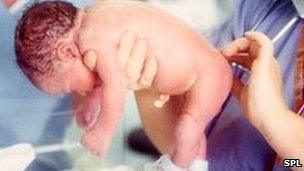'Too posh to push myth' exposed, say researchers
- Published

One in four babies is delivered by Caesarean section in Britain
It is "unlikely" that women undergo caesarean sections to avoid the pain of childbirth, research suggests.
Most caesareans were carried out for medical reasons, the review of 620,000 births in England in 2008 found.
Large variations were found from hospital to hospital, but these were down to differences in practice, the Royal College of Obstetricians and Gynaecologists team said.
Caesarean rates have more than doubled since the 1980s.
Far from being an "easy alternative" to traditional labour, it is still regarded as major surgery, despite increases in safety over the past two decades which have reduced the need for general anaesthetics.
Like any major operation, it carries the risk of bleeding and infection, and the wound can also make it harder for a new mother to cope in the first few weeks following birth.
As such, it is generally reserved for cases in which the risks of delivering clearly outweigh the risks of a Caesarean.
Sharp rise
However, the reason for the sharp rise in caesareans is not entirely clear, with some suspicion some low-risk women were being offered it for non-medical reasons.
The study published in the British Medical Journal looked at data for more than 620,000 single baby births in England in 2008 at 146 NHS Trusts.
Of these, 147,726 were delivered by caesarean, and the reasons for this choice were analysed.
Medical reasons were the most common - nine out of 10 women with a breech baby had one, and 71% of women who had previously had a Caesarean opted to have another.
A clear majority of women with serious medical complications in labour also had the operation.
There was no evidence low-risk women were being given caesareans inappropriately.
Caesarean rates varied widely between hospital trusts, with 14.9% at the lowest and 32.1% at the highest.
They concluded the reason for this was probably the different points at which doctors decided problems in labour were severe enough to merit a caesarean.
The lack of a precise medical definition for either "foetal distress" or for abnormal or difficult labour in general, could be responsible as some doctors and midwives may be less prepared to allow labour to continue naturally as potential problems are spotted.
And writing in the BMJ, the researchers said: "It seems unlikely that maternal request in the absence of any clinical indication contributes substantially to the rates."
The researchers called on individual hospitals and NHS regions to look closely at the reasons for high caesarean rates in their area.
Researcher Dr Tahir Mahmood said: "It was often thought that there was a north-south divide in the rates.
"Because it appeared that more women in the south had them, it was then assumed that these women had a preference for elective caesarean.
"Our research has shown that the north-south divide is mostly due to clinical reasons."
Mary Newburn, from the National Childbirth Trust, said: "This research scotches the myth there is a large group of women clamouring for caesarean on demand.
"Most women want to avoid major surgery if they have a good chance of a safe, straightforward birth, as is the case for the large majority of mothers."
Mervi Jokinen, from the Royal College of Midwives, said it was good women's choices were no longer being blamed for increasing caesarean rates.
She said: "The massive driving force in the rise of caesarean sections is the threat of litigation faced by hospitals and clinical teams."
- Published30 June 2010